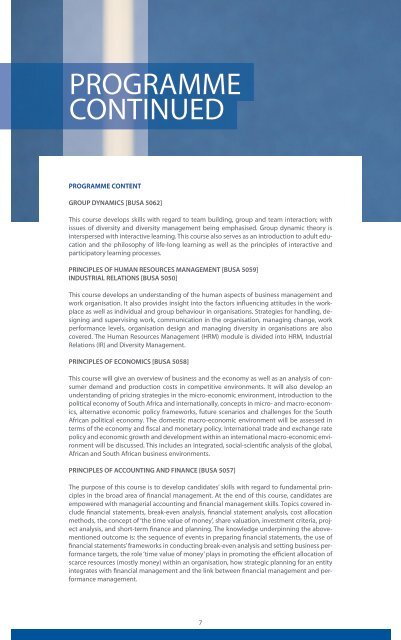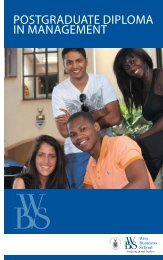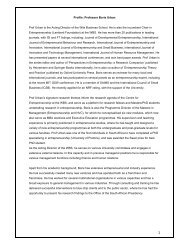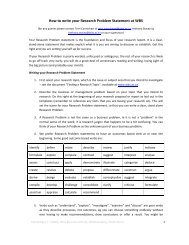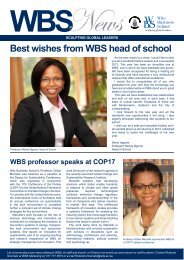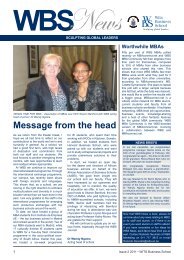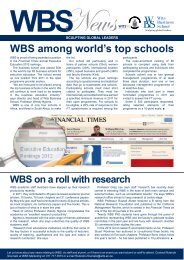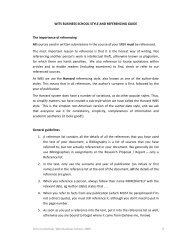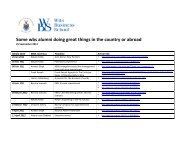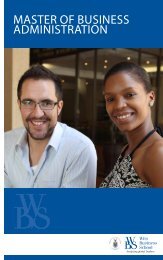map - Wits Business School
map - Wits Business School
map - Wits Business School
Create successful ePaper yourself
Turn your PDF publications into a flip-book with our unique Google optimized e-Paper software.
PROGRAMME<br />
CONTiNuED<br />
PROGRAMME CONTENT<br />
GROUP DYNAMICS [BUSA 5062]<br />
This course develops skills with regard to team building, group and team interaction; with<br />
issues of diversity and diversity management being emphasised. Group dynamic theory is<br />
interspersed with interactive learning. This course also serves as an introduction to adult education<br />
and the philosophy of life-long learning as well as the principles of interactive and<br />
participatory learning processes.<br />
PRINCIPLES OF HUMAN RESOURCES MANAGEMENT [BUSA 5059]<br />
INDUSTRIAL RELATIONS [BUSA 5050]<br />
This course develops an understanding of the human aspects of business management and<br />
work organisation. it also provides insight into the factors influencing attitudes in the workplace<br />
as well as individual and group behaviour in organisations. Strategies for handling, designing<br />
and supervising work, communication in the organisation, managing change, work<br />
performance levels, organisation design and managing diversity in organisations are also<br />
covered. The Human Resources Management (HRM) module is divided into HRM, industrial<br />
Relations (iR) and Diversity Management.<br />
PRINCIPLES OF ECONOMICS [BUSA 5058]<br />
This course will give an overview of business and the economy as well as an analysis of consumer<br />
demand and production costs in competitive environments. it will also develop an<br />
understanding of pricing strategies in the micro-economic environment, introduction to the<br />
political economy of South Africa and internationally, concepts in micro- and macro-economics,<br />
alternative economic policy frameworks, future scenarios and challenges for the South<br />
African political economy. The domestic macro-economic environment will be assessed in<br />
terms of the economy and fiscal and monetary policy. international trade and exchange rate<br />
policy and economic growth and development within an international macro-economic environment<br />
will be discussed. This includes an integrated, social-scientific analysis of the global,<br />
African and South African business environments.<br />
PRINCIPLES OF ACCOUNTING AND FINANCE [BUSA 5057]<br />
The purpose of this course is to develop candidates’ skills with regard to fundamental principles<br />
in the broad area of financial management. At the end of this course, candidates are<br />
empowered with managerial accounting and financial management skills. Topics covered include<br />
financial statements, break-even analysis, financial statement analysis, cost allocation<br />
methods, the concept of ‘the time value of money’, share valuation, investment criteria, project<br />
analysis, and short-term finance and planning. The knowledge underpinning the abovementioned<br />
outcome is: the sequence of events in preparing financial statements, the use of<br />
financial statements’ frameworks in conducting break-even analysis and setting business performance<br />
targets, the role ‘time value of money’ plays in promoting the efficient allocation of<br />
scarce resources (mostly money) within an organisation, how strategic planning for an entity<br />
integrates with financial management and the link between financial management and performance<br />
management.<br />
7


